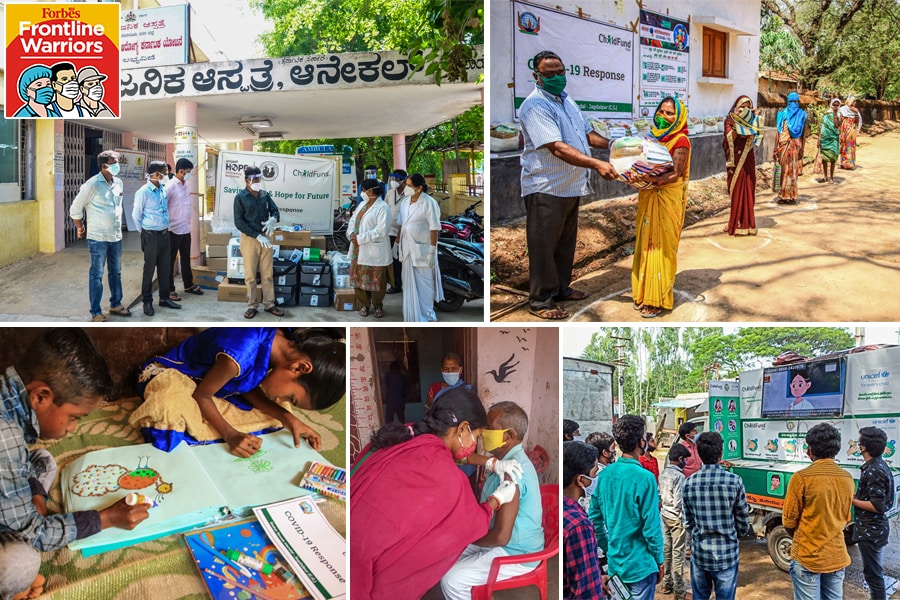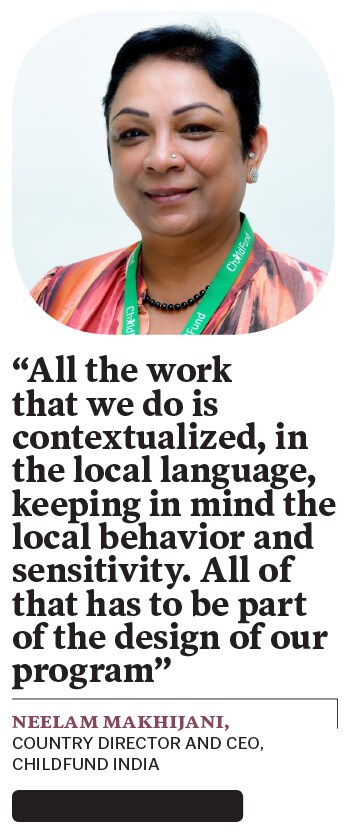Arming rural health centres to tackle Covid-19
ChildFund India is providing health centres in remote areas with medical equipment and training, sensitising people about vaccines


 Clockwise from above: A primary health center in Bengaluru receives medical equipment from ChildFund India Food and hygiene kits were provided to the locals in Jagdalpur, Chattisgarh, April 2020 The project undertook mobile campaigns on vaccination in coordination with the government, demonstrating various social and behavioural change activities, Chittoor district A frontline worker vaccinating a villager in ChildFund India’s project village in Nuapada district, Odisha. Children engaged in art activity conducted by ChildFund India amid the pandemic[br]
Clockwise from above: A primary health center in Bengaluru receives medical equipment from ChildFund India Food and hygiene kits were provided to the locals in Jagdalpur, Chattisgarh, April 2020 The project undertook mobile campaigns on vaccination in coordination with the government, demonstrating various social and behavioural change activities, Chittoor district A frontline worker vaccinating a villager in ChildFund India’s project village in Nuapada district, Odisha. Children engaged in art activity conducted by ChildFund India amid the pandemic[br]
ChildFund India has provided relief material, basic medical equipment and medical kits to health care workers and centres in remote areas through the two waves of the Covid-19 pandemic. Now it is gearing up to tackle the impending third wave by planning vaccination drives and setting up child-friendly Covid-19 care centres.
“Whatever we see on television is all about the urban population, and when the rural finds mention, it gets forgotten. These are the forgotten people of the country," says Neelam Makhijani, country director and CEO, ChildFund India. “We work in the hard-to-reach areas, with tribal communities, where literacy levels are extremely low."
ChildFund, a child development organisation, has been working with underprivileged children, youth and families in remote, backward, and inaccessible areas in India since 1951, and provides support to children until they reach 24 years of age. It reached 1.5 million people during the first Covid-19 wave, by providing them with relief material, livelihood recovery opportunities, psycho-social support, and medical aid. During the second wave of the pandemic, it is supporting primary and secondary health care centres with medical equipment, so that they can serve as Covid-19 care centres. So far, ChildFund has supplied medical equipment to 100 health care centres in seven states.

Makhijani says, “If you have been to any primary health centre, you will realise there is hardly anything available, and the doctor hardly shows up." So, when the second wave of the pandemic struck, ChildFund identified high-prevalent villages and provided medical kits to Asha and ANM workers, along with training them on screening and referrals of Covid cases to other health centres. “We aim to reach 5,000 frontline workers and have already reached 3,000," she adds.
ChildFund has received $1.5 million from Project Hope, an international health care organisation. “Project Hope initially got us started by committing such a large amount. In some states, it has agreed to fund child-friendly Covid care centres," says Makhijani.
“To protect children and adolescents, who may be vulnerable in a third wave, we are transforming paediatric wards at primary health care units into child-friendly Covid care centres, which is a new concept in India," says Pratibha Pandey, senior health specialist, ChildFund India. “We are working with communities so that they are prepared to manage the effects of Covid on children, which includes children with single parents and orphans."
With apprehensions of an impending third wave of the pandemic, the organisation is gearing up to support government efforts of vaccinating rural populations in remote areas. “There is a general misconception among villagers that the vaccine has side-effects and can even result in death. We have to work on sensitisation, as enough efforts have not been made to correct their misgivings," says Makhijani.
ChildFund India aims to vaccinate at least 1 million people in 15 states and vaccinate at least 70 percent of people in 3,000 villages within nine months. “The vaccine shortage is going to be resolved by July, with the introduction of vaccines such as Sputnik and Pfizer. We are hopeful to meet the targets," says Makhijani.
First Published: Jun 22, 2021, 12:10
Subscribe Now